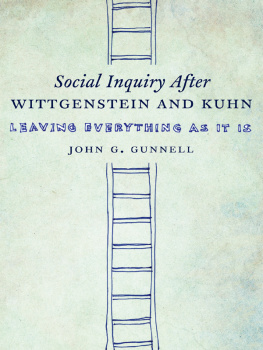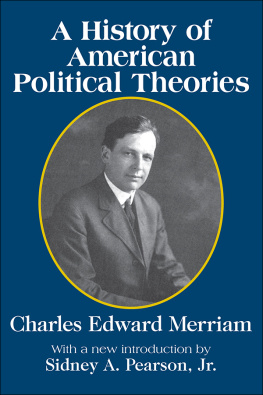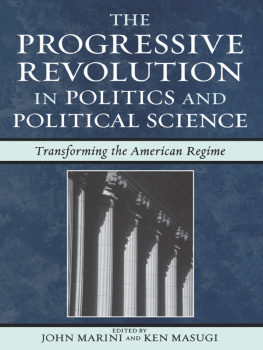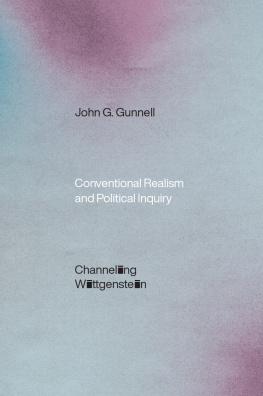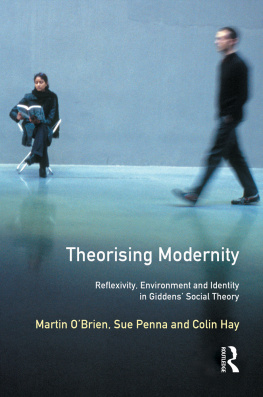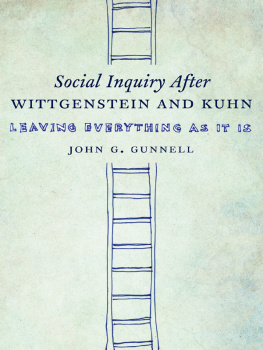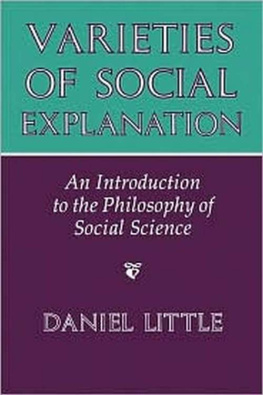Social Inquiry After Wittgenstein and Kuhn
SOCIAL INQUIRY AFTER WITTGENSTEIN & KUHN
Leaving Everything as It Is
John G. Gunnell
Columbia University Press New York
COLUMBIA UNIVERSITY PRESS
Publishers Since 1893
New York Chichester, West Sussex
cup.columbia.edu
Copyright 2014 Columbia University Press
All rights reserved
E-ISBN 978-0-231-53834-3
LIBRARY OF CONGRESS CATALOGING-IN-PUBLICATION DATA
Gunnell, John G.
Social inquiry after Wittgenstein and Kuhn: leaving everything as it is / John G. Gunnell.
p. cm.
Includes bibliographical references and index.
ISBN 978-0-231-16940-0 (cloth : alk. paper)ISBN 978-0-231-53834-3 (e-book)
1. Social SciencesPhilosophy. 2. Wittgenstein, Ludwig, 18891951. 3. Kuhn, Thomas S. I. Title.
H61.15.G86 2014
300.1dc23
2014008130
A Columbia University Press E-book.
CUP would be pleased to hear about your reading experience with this e-book at .
Cover design: Chang Jae Lee
References to websites (URLs) were accurate at the time of writing. Neither the author nor Columbia University Press is responsible for URLs that may have expired or changed since the manuscript was prepared.
To Aldisa, for her patience and constructive skepticism
If the place I want to reach could only be climbed up to by a ladder, I would give up trying to get there.
LUDWIG WITTGENSTEIN
To make light of philosophy is to be a true philosopher.
BLAISE PASCAL
I just want to know what the truth is.
THOMAS KUHN
Believe those who are seeking the truth. Doubt those who find it.
ANDR GIDE
Contents
THE BASIC PURPOSE OF THIS VOLUME is to present the work of Ludwig Wittgenstein and Thomas Kuhn as a vision of social inquiry. The book is addressed primarily to scholars and students in the social and human sciences and to philosophers of social science, but I hope that along the way I have made a contribution to the interpretation of the work of Wittgenstein and Kuhn. My sympathetic reading of their work has at times made me wonder whether I was clarifying their arguments or whether these arguments had, as Wittgenstein hoped, simply stimulated thoughts of my own. I have benefited from the vast secondary literature on their work, in both philosophy and social theory, but that literature has, I believe, in some instances at least, been pushed dangerously close to crossing the threshold of over-interpretation and has become the source of a considerable amount of academic folklore. Approaching Wittgenstein and Kuhn by threading ones way through this maze of literature can, however, easily lead to intellectual vertigo as well as inhibit directly engaging their texts, and I have only made sparse direct reference to that literature.
, I examine that connection, both conceptually and historically, but my contention is that there is a basic parallel between, on the one hand, Wittgensteins approach to conceptual investigations and, on the other hand, the philosophy and history of science as practiced by Kuhn. They both focused on how concepts are internally related to, and constitutive of, social practices; addressed what is involved in the tasks of understanding and interpreting these practices; and examined both the epistemic and practical relationship between philosophical inquiry and its subject matter, which are issues that any form of social inquiry must confront.
Pascal once noted that the last thing one settles in writing a book is what one should put in first, and this was the case in formulating this volume. Wittgenstein noted that in composing the Investigations, he had found that the issues he confronted seemed to intersect in a manner that made it very difficult to produce a linear presentation that belonged to a uniform genre. I experienced a similar problem, but despite the diversity among the chapters, they are integrated both thematically and with respect to the development of Wittgensteins ideas. I have devoted careful attention to what Wittgenstein actually said, because one of the most disturbing things about much of the commentary on his work, in both philosophy and social science, has ultimately been a neglect of what Robert Fogelin (2009) referred to as taking Wittgenstein at his word. I wanted to let him speak for himself rather than invent a Wittgenstein for my own purposes or dwell on, and speculate about, either the influence of the contexts in which he wrote or putative intentions behind his words. Wittgenstein stressed how language speaks for itself, and I am assuming that his work also speaks for itself. Consequently, I have given careful attention to his texts and the shape and flow of his remarks. I have quoted extensively from his work in the course of interpreting it, and some readers may think excessively, but although it is possible to rephrase, paraphrase, and summarize many of his remarks, his own words capture the subtleties involved. It is not, as many seem to believe, that his work is so difficult to understand, but it is difficult to interpret, that is, to find the language in which to describe and convey it. Although I have remained sensitive to biographical information about Wittgenstein, such as in Ray Monks (1990) superb volume, various personal memoirs of both Wittgenstein and his students, and studies of his intellectual and social environment, I am basically concerned with the content of his work.
There have been many attempts to assess the implications of Wittgensteins philosophy for thinking about the nature of social science and social theory, and Kuhns work has been a constant source of discussion in these fields. The following chapters, however, are not devoted to an analysis of the reception of their work. I have previously addressed this matter at length, and it is sufficient to note that despite instances of astute readings and applications, this reception has most typically involved either seeking support for a variety of prior commitments or negatively characterizing them as progenitors of modern relativism and as a danger to the search for truth in both science and ethics. Such preconceptions distance us from understanding their work and recognizing its importance for illuminating the concept of social inquiry, and, particularly, the manner in which such inquiry is an interpretive endeavor.
For well over a century, and certainly from at least Max Weber to the present, there have been variations on a continuing debate about whether social science is a naturalistic or humanistic form of inquiry. Although the philosophical myth of a scientific method, on which so much of the naturalistic argument was based, has been thoroughly undermined, the alternative has remained only porously articulated. Even though my rendition of Wittgensteins conception of social inquiry is fundamentally in conflict with the claim that social science should, or can be, devoted to causal explanations analogous to those in the natural sciences, my purpose here is not to reengage that old battle. I do, however, address the basic criteria of demarcation. My concern is not to legislate with respect to the details of any specific field of inquiry, but rather to provide substance to investigations, and images of investigation, based on the assumption that social inquiry involves the recovery of the meaning of language and human action. For many years, I have argued that political theory and political inquiry in general are not, in terms of either theory or method, sui generis. It is the fundamental principles of inquiry that are the subject of the following chapters, and most of the positive and negative implications for specific areas of research will be apparent, even if not always specified and described. There are aspects of the following chapters, particularly the discussion of mental concepts, which may be viewed as excruciatingly detailed, but this is compensation, or revenge, for the theoretical shallowness of contemporary treatments of such matters in the social and human sciences.

